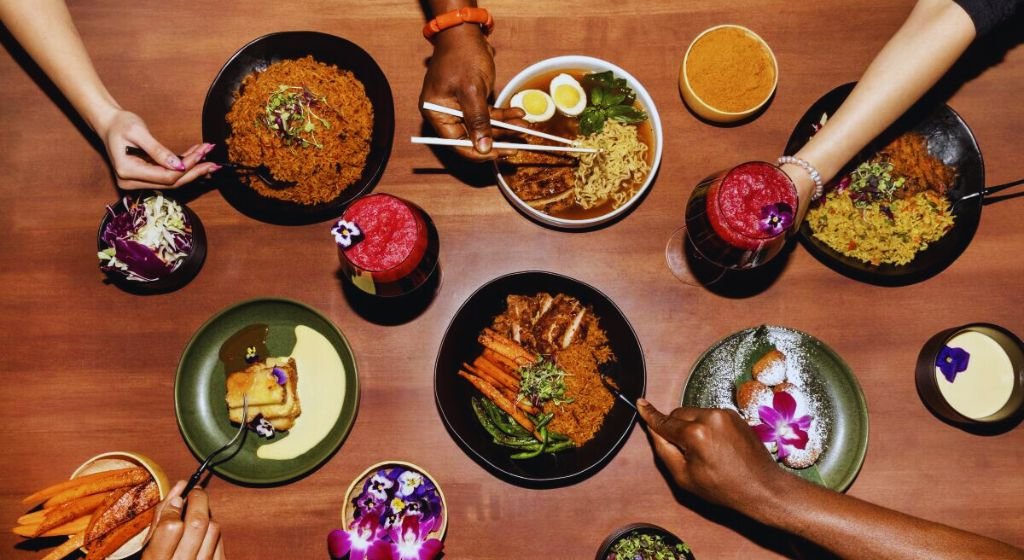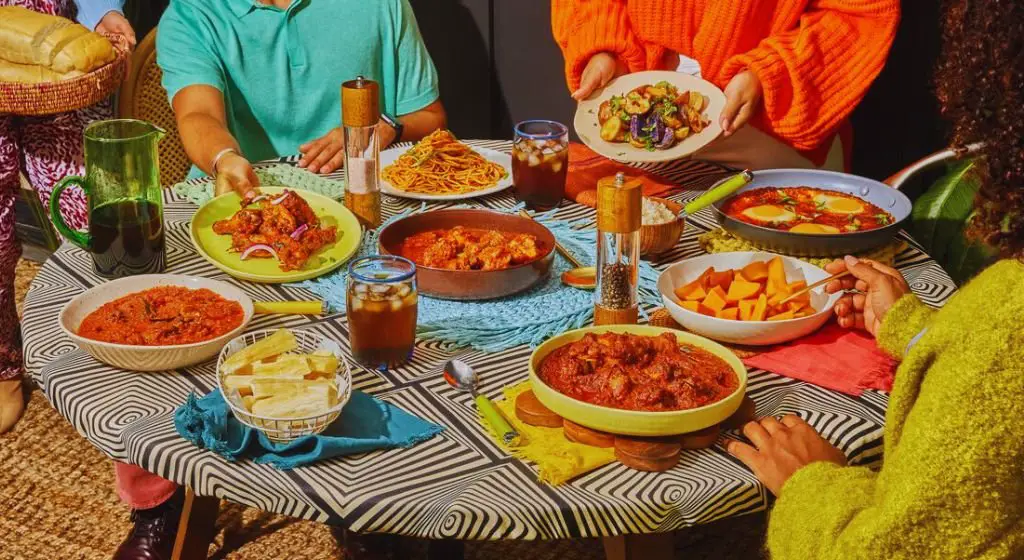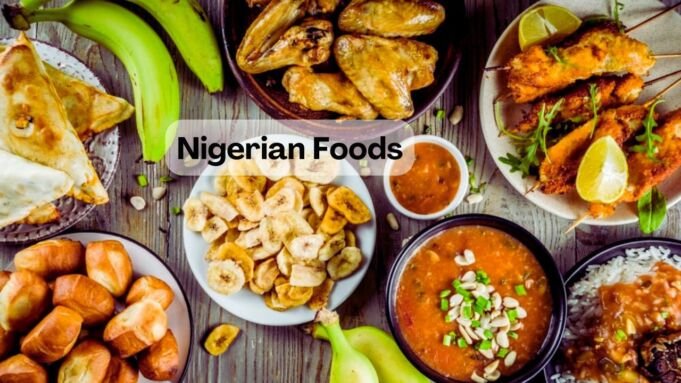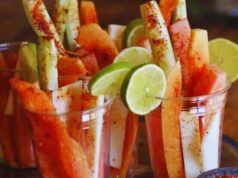Nigerian foods, similar to other West African culinary traditions, are celebrated for their bold, spicy, and fragrant dishes. While Jollof rice stands out as the most renowned dish, the culinary depth of Nigeria extends far beyond, particularly with its variety of intensely flavored soups and stews, along with an extensive selection of “swallow” foods.
Nigerian food, with its diverse ethnic groups and rich cultural heritage, offers a vibrant palette of flavors, ingredients, and dishes that reflect the country’s love for hearty, flavorful meals. From the bustling streets of Lagos to the serene landscapes of the Niger Delta, every region brings its unique taste to the table, creating a culinary mosaic that is as intriguing as it is delicious. This article explores the essence of Nigerian food, highlighting the traditional dishes, cooking techniques, and ingredients that make Nigerian Food a remarkable journey for the taste buds.
What is Nigerian Food?
Nigerian Food reflects the diverse culinary traditions of its over 250 ethnic groups, sharing many features with neighboring West and Central African countries like Ghana, Benin, and Cameroon.
Staple foods such as yam, cassava, plantains, rice, and beans are central to the Nigerian diet, often accompanied by a variety of rich soups and stews featuring meat and vegetables. Vegetable stews are a favorite, eaten frequently throughout the week.
In Nigeria, the whole animal is used in cooking, minimizing waste. Favorite meats include beef, goat, chicken, and turkey, with common vegetables being Lagos spinach, water leaves, and pumpkin leaves.
Many Nigerian dishes commonly use ingredients like ground African crayfish, dry ground pepper, and Maggi cubes for flavoring, with palm and groundnut oil as popular cooking fats.
The Heart of Nigerian Foods
At the core of Nigerian cooking is a deep appreciation for fresh, locally sourced ingredients, ranging from leafy vegetables and exotic spices to a wide variety of proteins including beef, chicken, goat, and an abundance of seafood. Grains such as rice, maize, and millet, along with tubers like yams and cassava, form the staple of many meals, providing a comforting base for the rich, spicy flavors that characterize Nigerian dishes.
Related: Turkish Foods
How a Nigerian Meal Is Structured?
In Nigerian culinary tradition, meals typically revolve around a single, substantial dish rather than multiple courses. Depending on the time, this could range from akara or moin moin to a hearty combination of rice, beans, and stewed vegetables.
A typical lunch at home might feature rice and stew accompanied by fried plantains (dodo) and vegetable soup (efo), or perhaps a soup rich with nuts, seeds, and vegetables served with a starchy side like eba or lafun, complemented by zobo or similar beverages. At social gatherings, the meal might start with an assortment of appetizers known as “small chops,” such as puff puff, followed by a main course of jollof or fried rice, moin moin, and dodo.
These examples represent just a fraction of the vast array of Nigerian dishes that are celebrated and savored throughout the country. They offer a glimpse into the Nigerian dining experience, showcasing the diverse flavors—from sweet and salty to smoky, umami, and spicy—that Nigerian palates enjoy, illustrating the culinary diversity from the North to the South and from the East to the West.
Signature Nigerian Dishes

Nigerian food is a vibrant symphony of flavors and offers an array of signature dishes that embody the heart and soul of its rich culture. From the smoky allure of Suya to the comforting embrace of Jollof Rice, each dish tells a story of tradition, community, and culinary ingenuity, captivating palates with a blend of sweet, salty, smoky, umami, and spicy flavors.
Jollof Rice
No discussion of Nigerian food is complete without mentioning Jollof Rice. This beloved dish is a celebration of rice cooked in a tomato-based sauce, infused with spices and ingredients like onions, garlic, and sometimes bell peppers, often accompanied by pieces of fish, meat, or vegetables. Each region boasts its own variation, making Jollof Rice a versatile and universally adored dish across Nigeria.
Pounded Yam and Egusi Soup
Pounded Yam, a smooth, stretchy dough made from yams, serves as the perfect complement to Egusi Soup, a thick, hearty stew made with ground melon seeds, leafy vegetables, and meat or fish. This combination is a testament to the Nigerian knack for pairing textures and flavors to create fulfilling meals.
Suya
Suya, a popular street food, consists of spicy skewered meat, traditionally beef, chicken, or goat, marinated in a mixture of spices and ground peanuts, then grilled to perfection. It’s a flavorful snack that captures the essence of Nigerian barbecue culture.
Moi Moi
Moi Moi is a nutritious steamed bean pudding made from ground peeled beans, typically black-eyed peas, mixed with peppers, onions, and an array of optional ingredients like fish, eggs, or corned beef. It’s a versatile dish that can serve as a side or a main course.
Pepper Soup
A light, broth-based soup seasoned with a variety of local spices and herbs, Pepper Soup can feature fish, chicken, goat, or beef. It’s known for its intense heat and is believed to have medicinal properties, often serving as a remedy for colds and fever.
Read More: Best Restaurants in Gatlinburg for Every Food Lover
25 Most Popular Nigerian Foods
The rich tapestry of flavors that Nigerian Food has to offer with our exploration of the 25 most popular Nigerian foods. From the smoky allure of Suya to the comforting warmth of Jollof Rice, each dish offers a glimpse into the country’s diverse culinary landscape, celebrating tradition, flavor, and communal joy. Indulge in this culinary journey that promises to enchant your taste buds and deepen your appreciation for Nigeria’s vibrant food culture.
Jollof Rice
Jollof Rice is a beloved dish in Nigeria, consisting of long-grain rice cooked in a flavorful tomato sauce with onions, peppers, and a variety of spices. It’s a party staple, often served with chicken, beef, or fish, embodying the spirit of Nigerian festivities.
Pounded Yam and Egusi Soup
Pounded Yam, served with Egusi Soup, is a cherished combination. The soup, made from ground melon seeds, greens, and meat, complements the smooth, stretchy yam. This meal is a traditional delight, showcasing the rich textures of Nigerian Food.
Suya
Suya, a popular street snack, features thinly sliced meat marinated in spices and grilled. This spicy kebab is a favorite for its smoky flavor and is usually served with slices of onions and tomatoes, offering a quick taste of Nigerian culinary expertise.
Akara
Akara are deep-fried bean cakes made from blended black-eyed peas, onions, and spices. Enjoyed as a breakfast item or snack, these golden balls are a testament to the simplicity and flavor of Nigerian street food.
Moi Moi
Moi Moi is a steamed bean pudding that highlights the versatility of Nigerian food. Made from pureed beans and flavored with peppers, onions, and fish or eggs, it’s a protein-rich dish often enjoyed as a side or main meal.
Pepper Soup
Pepper Soup is a spicy, broth-based delicacy, seasoned with local herbs and spices, and can contain fish, chicken, or goat. It’s renowned for its medicinal properties, offering comfort and warmth with every sip.
Ofada Rice and Ayamase
Ofada Rice, paired with Ayamase sauce, is a flavorful duo. The indigenous rice served with a spicy green pepper sauce, alongside assorted meats, captures the essence of local Nigerian flavors.
Efo Riro
Efo Riro, a spinach stew, is cooked with meat, fish, and a rich mix of spices. This nutrient-packed stew is a staple in Nigerian homes, celebrated for its versatility and depth of flavor.
Fufu
Fufu, a starchy accompaniment, is made by mashing yams, plantains, or cassava. It’s a fundamental part of Nigerian food, perfect for scooping up soups and stews.
Boli
Boli, or grilled plantain, is a simple yet delicious street food. Its smoky sweetness makes it a favorite snack or side dish, often enjoyed with groundnut or pepper sauce.
Okra Soup
Okra Soup, known for its slimy texture, combines okra with meat and seafood, creating a hearty and healthful dish. It’s widely consumed across Nigeria, often paired with fufu or rice.
Garri
Garri, a cassava-derived staple, is enjoyed either as a cold snack with sugar and water or used to make a thick dough for soups. Its versatility makes it an essential part of Nigerian food culture.
Ogbono Soup
Ogbono Soup features ground African mango seeds, creating a unique, mucilaginous texture. This rich soup is filled with meat and greens, offering a distinctive taste beloved by Nigerian households.
Nkwobi
Nkwobi is a delectable dish made from cow feet, cooked until tender and mixed with a spicy palm oil sauce. It’s a popular delicacy, especially in the southeastern part of Nigeria.
Amala and Abula
Amala, made from yam flour, is enjoyed with Abula, a blend of Gbegiri (bean soup) and Ewedu (jute leaves). This rich, flavorful pairing is a testament to Yoruba culinary tradition.
Beans and Plantain
Beans and Plantain combine creamy cooked beans with sweet, fried plantains. This nutritious and satisfying meal highlights the harmonious blend of flavors in Nigerian food.
Afang Soup
Afang Soup, a vegetable soup from the Efik, is made with Afang leaves and waterleaf. Rich in meat and seafood, it’s a nutritious, flavorful dish that reflects the culinary diversity of Nigeria.
Banga Soup
Banga Soup, a palm nut soup, is a southern Nigerian specialty. Savory and rich, it’s typically served with starch or pounded yam, featuring meat or fish for a fulfilling meal.
Tuwo Shinkafa
Tuwo Shinkafa, a rice pudding from northern Nigeria, is often served with hearty soups like Miyan Kuka. Its smooth, comforting texture makes it a favorite staple.
Dodo
Dodo, or fried ripe plantains, is cherished for its sweet, caramelized edges. A versatile side dish, it complements a variety of Nigerian meals, adding a touch of sweetness to savory dishes.
Asun
Asun is a tantalizing Nigerian delicacy made from spicy grilled goat meat that has been marinated in a rich blend of peppers and spices, and then grilled over an open flame to achieve a perfect smoky taste. This dish is often served at parties and gatherings, celebrated for its unique flavor profile that combines heat from the spices with the succulence of the goat meat, making it a favorite among those who appreciate bold, aromatic flavors.
READ: How Many People Visit Fast Food Restaurants?
Bring Traditional Nigerian Food to your Table

Nigeria is celebrated for its vibrant history and dynamic culinary scene. For those looking to explore Nigerian flavors from the comfort of their own kitchen, the following traditional Nigerian dishes serve as a perfect introduction:
- Jollof rice
- Tuwo shinkafa
- Fufu
- Afang soup
- Eba
- Efo riro
- Nkwobi
- Ogbono soup
- Suya
- Moin Moin
- Fried plantains
- Egusi soup
- Ewedu soup
For Nigerians residing overseas, Remitly offers a convenient solution for remitting funds to family and friends back home.
Read More: AirFood Recipes
Ingredients that Define Nigerian Cooking
The richness of Nigerian food comes from its ingredients. Spices like nutmeg, cinnamon, and local varieties such as Calabash nutmeg and African Negro pepper add depth to dishes. Palm oil, with its distinctive flavor and red color, is a staple in many recipes, while fermented locust beans (Iru) provide a unique umami flavor.
Nigerian Food Cooking Techniques
Traditional Nigerian cooking involves a variety of techniques, from grilling (as seen in Suya) to frying, steaming (Moi Moi), and boiling. The preparation of soups and stews often involves simmering ingredients over low heat to allow the flavors to meld beautifully, a process that reflects the Nigerian love for rich, deeply flavored dishes.
The Role of Food in Nigerian Culture
In Nigeria, food is more than sustenance; it’s a celebration of community and tradition. Meals are often shared, and cooking is considered an act of love. Festivals and ceremonies are incomplete without an abundance of food, showcasing the central role cuisine plays in Nigerian social and cultural life.
Conclusion
Nigerian food is a testament to the country’s rich cultural diversity and culinary ingenuity. From the smoky flavors of Suya to the comforting warmth of Pounded Yam and Egusi Soup, Nigerian dishes offer a journey through a world of flavors, textures, and aromas. This culinary tradition, rooted in history and community, continues to evolve, inviting the world to explore and savor its rich tapestry of tastes.
Read Also: French Foodie in Dublin Irish Food Blog Tours and Events
Frequently Asked Questions (FAQs) about Nigerian Food
Below you can find a few commonly asked questions. Let’s check them out.
What makes Nigerian food unique?
Nigerian food is known for its bold flavors, extensive use of spices, and diverse dishes that reflect the country’s rich cultural heritage. Its uniqueness comes from the combination of aromatic spices, a variety of proteins, and the traditional “swallow” foods that accompany soups and stews.
Is all Nigerian food spicy?
While many Nigerian dishes are spicy due to the generous use of chili peppers and spices, the cuisine offers a range of flavors from mild to very hot. The spice level can often be adjusted to suit individual tastes.
What is a “swallow” food in Nigerian cuisine?
“Swallow” refers to a group of starchy foods that are cooked and then pounded or kneaded into a smooth, dough-like consistency. They are typically served as accompaniments to soups and stews and are eaten by pinching off a small piece and dipping it into the sauce.
Can I find vegetarian options in Nigerian cuisine?
Yes, Nigerian food includes several vegetarian options, especially among the soups and side dishes. Dishes like Moi Moi (steamed bean pudding), Akara (bean cakes), and various vegetable stews and salads offer delicious vegetarian choices.
What are some must-try Nigerian dishes?
Some must-try Nigerian dishes include Jollof Rice, Pounded Yam with Egusi Soup, Suya (spicy grilled meat), Ofada Rice with Ayamase sauce, and Moi Moi. These dishes provide a good introduction to the flavors and textures of Nigerian cuisine.
How is Nigerian Jollof rice different from other types of Jollof rice?
Nigerian Jollof rice is known for its unique seasoning and preparation method, which often includes cooking the rice in a flavorful tomato and pepper blend along with spices. Each West African country has its own version, but Nigerian Jollof is celebrated for its rich taste and the slightly smoky flavor achieved by cooking it over firewood in some traditional settings.
Are there any Nigerian desserts or sweets?
Yes, Nigeria offers a variety of desserts and sweets. Popular options include Puff-Puff (deep-fried dough balls), Chin Chin (fried dough snacks), and Akara (sweet bean cakes). Nigerian sweets often incorporate local flavors like coconut, peanuts, and cassava.
















![25 Most Popular Honduran Foods [Savor the Spice of Life] Honduran Food](https://tourinplanet.com/wp-content/uploads/2024/05/Honduran-Food-300x160.jpg)




[…] READ: Nigerian Food […]
[…] READ: Nigerian Food […]
Comments are closed.